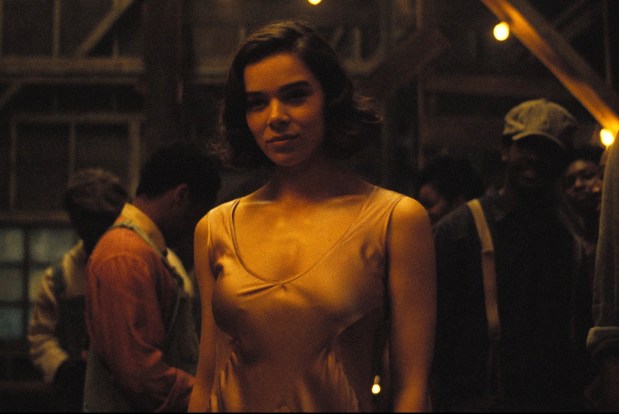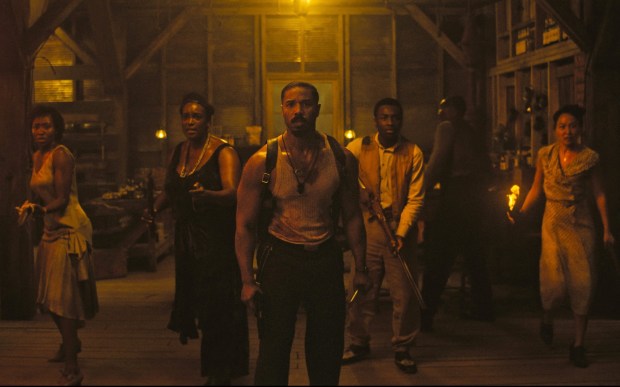“Sinners” is all over the place yet somehow all of a piece. Its themes aren’t new, but the variations feel fresh. Telling a fantastical tale of dark forces in plain sight, fed by the seductive power of music, “Sinners” also feels like apt timing for 2025 America, where the only thing we have to fear is no longer fear itself.
It’s also a movie made for movie theaters. Shooting in 65mm IMAX and Ultra Panavision 70, Coogler hands his steady collaborator Michael B. Jordan an extra-wide showcase for what old-school Hollywood ballyhoo used to call “a demanding dual role.” In beautiful Depression-era hats and threads courtesy of Oscar-winning costume designer Ruth E. Carter, Jordan plays twin brothers nicknamed Smoke and Stack, Chicago gangsters formerly affiliated with Al Capone.
Carrying scads of cash and a load of bootleg beer, they’ve returned home to segregated Clarksdale, Mississippi, to open a juke joint in an old sawmill. The white man making the sale, the twins assume, is fully vested in the local Ku Klux Klan chapter, despite the man’s grinning assurance that “the Klan don’t exist no more.”
“Sinners” actually opens with another set of twins, Fore and Shadow. In a prologue, the badly scarred and limping preacher’s son Sammie (Miles Caton) hobbles up to the front door of his father’s chapel mid-sermon, clutching the snapped neck of his precious guitar. There’s a story there. In eyeblink flashes of screams, flames and red-eyed demons, Coogler foreshadows the genre mashup to come by hinting at what has transpired over the last few hours.
Much of “Sinners” follows Smoke and Stack’s preparations for an opening night to remember. They enlist some old acquaintances for the job, including wizened harmonica ace Delta Slim, played exquisitely by Delroy Lindo. His specially tailored gravel speaking voice alone is worth Oscar consideration.
At the train station where Delta Slim performs, the rapscallion Stack reunites, uneasily, with old flame Mary (Hailee Steinfeld), who has been waiting a little too long for the charming dog who ditched her. Biracial and essentially passing for white, Mary eyes Stack with a look that says if looks could kill. Yet her bitterness is tangled up with longing, and a loveless marriage to an Arkansas man isn’t much protection from her rekindled desire.
Smoke, meantime, braces himself for his own bittersweet reunion. Seven years ago, he left behind a Hoodoo conjure woman named Annie (Wunmi Mosaku), with whom he had a tragically short-lived son. This plantation laborer has been on the spiritual lookout for Smoke’s safety ever since he and Stack fought in the Great War and then went north to Chicago. “I heard they ain’t got Jim Crow up there,” Sammie says to his gangster cousins en route to the juke joint. The twins know better; Chicago may have “tall buildings instead of plantations,” one says, but the raw deal for Black America remains roughly the same.
We meet many others in this willfully overpacked character roster, among them the Chinese immigrant grocers Bo and Grace Chow (Yao and Li Jun Li), who help get the joint ready for jumping. When the sun goes down and the doors open, Sammie, guitar in hand, lights the place on fire musically with the blues rouser “I Lied to You,” written by the film’s composer Ludwig Göransson and Raphael Saadiq. Coogler expands the moment here to embrace his central idea of deep-rooted music “so true,” it pierces the veil between the real and the supernatural, connecting the past with the future.
Visually, this means the dance floor is joined by emissaries from this outer ancestral realm, with West African tribal members, Peking opera figures, First Nation warriors and pre-colonial Irish sharing space with blues-based guitarists from the future and DJs working the turntable. Miraculously, the scene works; Coogler tests the limits of what “Sinners” can do, while setting up the shift into “Lovecraft Country”-style horror.
By this point, Coogler has already introduced a mysterious traveler named Remmick, portrayed with wily menace by Jack O’Connell, who has, we learn, clashed with some Choctaw tribesmen. (Describing this movie makes it sound wilder than it is, really.) Remmick and his accomplices, who play a little bluegrassy stuff of their own, pay a visit. From there,”] After Remmick and his accomplices pay a visit, “Sinners” borrows a page or three from one of Coogler’s acknowledged influences, the Robert Rodriguez pulp thriller “From Dusk Till Dawn,” setting up a vampires vs. humans melee.

Parts of that story transformation work, some less well. Coogler can let his characters’ verbosity get the better of story momentum. The hallucinatory scene of a maniacally step-dancing Remmick, hosting a bonfire-lit dance party for his latest undead victims, feels off, and arguably not quite crazy or delirious enough. Elsewhere, more prosaically, there are passages where the narrative cross-cutting and overall rhythm get a little heavy on its feet.
These are not deal breakers, though. The movie’s alive, and the actors seize the day, from Mosaku’s grave and beautifully modulated Annie to Steinfeld’s note-perfect embodiment of a femme fatale who’s fatale in unusual ways. Coogler makes the chief non-human antagonist, Remmick, more than just a pair of fangs waiting to happen. In varying degrees of subtlety and bluntness, “Sinners” establishes a through-line between the Jim Crow deep South, America’s longstanding tradition of white appropriation and outright theft of Black culture, and things a crafty white vampire might say to the juke joint’s multicultural crew to gain their trust. “Can we just once all be family?” he pleads, waiting for the invitation he needs to commence the bloodshed.
“White folks like the blues just fine,” Delta Slim tells Sammie earlier that same day. “They just don’t like the folks who make it.” The vision of 1932 Mississippi in “Sinners” may be idealized — the downtown Clarksdale sequences depict an easy intermingling of white, Black and Asian residents, which is a stretch — but this is, after all, folklore territory, with top-flight work from all the design departments and from cinematographer Autumn Durald Arkapaw.
Coogler adds telling flourishes here and there, things not found in your average gangster movie, or vampire movie, or Delta blues fairytale. Stack, the more brutal of the two twins finessed with confidence by Jordan, gives a local girl he’s paying to watch his automobile a 30-second tutorial in how to negotiate for better pay. Coogler may well have drawn from memories of his own “Black Panther” contract negotiations here. And “Sinners” takes a straightforward interest in carnal desire, which is rarer than it sounds. More than once, the dialogue makes space for Sammie learning about female pleasure from his worldly gangster cousin. If that recurring element of this percolating stewpot of a movie connects with even a handful of paying customers, “Sinners” might just qualify for sex-positive sainthood.
“Sinners” — 3 stars (out of 4)
MPA rating: R (for strong bloody violence, sexual content and language)
Running time: 2:17
How to watch: Premieres in theaters April 17
Michael Phillips is a Tribune critic.




